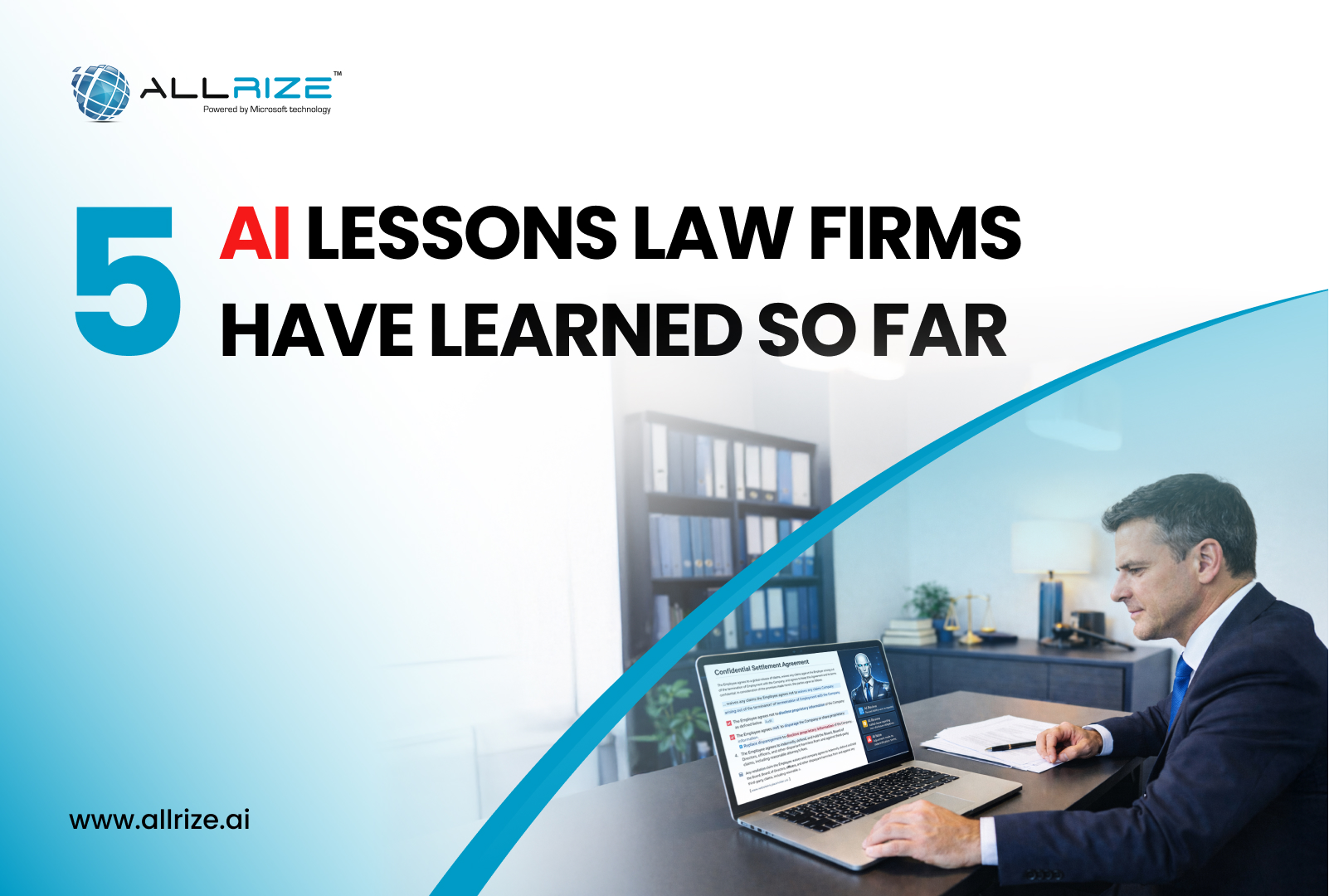Artificial intelligence is no longer a theoretical conversation for law firms. To varying degrees, AI is now an operational reality.
However, many firms have discovered that implementing AI is far more complex than purchasing a tool or rolling out access. The biggest lessons so far have been about workflow design, risk ownership, and strategy. As firms continue AI investment and implementation going forward, those lessons offer a clear roadmap for what to do differently.
Lesson 1: AI Doesn’t Fix Broken Workflows
One of the most consistent takeaways from law firms is that AI does not magically create efficiency. Firms that layered AI on top of existing workflows often found themselves adding steps instead of eliminating them. Lawyers spent time rechecking AI output line by line, duplicating work rather than reducing it.
The problem wasn’t the technology, it was the workflow. AI exposed and even exacerbated inefficiencies that already existed.
What to do differently:
Before deploying AI, firms should step back and map how work actually gets done. Identify where repetition exists, where judgment is required, and where speed truly adds value. Redesign workflows first, then apply AI intentionally.
Lesson 2: AI Risk Is Often Misunderstood
To date, much of the focus around AI risk has centered on accuracy and hallucinations. While those risks are real, many firms have learned that the bigger issues are organizational. Unclear accountability, inconsistent use, and undefined review standards often created more exposure than the AI output itself.
AI can draft, summarize, classify, and extract information at speed. What it cannot do is set priorities, weigh legal risk, or own outcomes. Those responsibilities still belong to people.
What to do differently:
Shift AI risk conversations away from “Is the AI accurate?” to “Who owns the decision?” Clearly define responsibility for AI-assisted work, document review expectations, and ensure human judgment remains central.
Lesson 3: Technology Without Strategy Can Overwhelm Teams
Another key lesson is how quickly AI adoption can overwhelm legal teams. Rapid tool proliferation, constant updates, and unclear expectations lead to anxiety rather than excitement, especially for lawyers already managing heavy workloads.
Firms that have framed AI as a race to keep up with competitors often encounter resistance. Those that focus on a small number of high-impact use cases often see better engagement and results.
What to do differently:
Adopt a focused AI strategy. Limit initiatives to areas with clear value, communicate why those initiatives matter, and give teams time to adapt. Training should emphasize how AI fits into legal judgment and decision-making, not just how to use the tools.
Lesson 4: AI Doesn’t Automatically Save Time
One of the biggest disconnects in implementation is the assumption that AI will automatically create efficiency. Many lawyers find themselves spending just as much time reviewing AI-generated work as they would have drafting it themselves. In practice, AI often shifts where time is spent rather than reducing it.
In most cases, this bottleneck can be attributed to a failure to rethink review standards rather than a limitation of the technology.
What to do differently:
Firms need to redefine review expectations for AI-assisted work. Review depth should be tied to risk and materiality. When expectations are calibrated appropriately, AI can meaningfully reduce low-value effort and accelerate decision-making without increasing risk.
Lesson 5: The Next Generation Approaches AI Differently
Law firms working closely with junior lawyers and law students are beginning to see a clear generational shift in how AI is viewed. For newer entrants to the profession, AI is an expected part of how modern work gets done. Their focus is less on whether AI should be used and more on how it can be applied responsibly.
What stands out most is that younger lawyers are not asking for more tools. They are asking for clarity: when to rely on AI, how to exercise judgment, and where accountability ultimately lies.
What to do differently:
Law firms should move beyond tool-based training for AI and invest in education that emphasizes judgment, risk assessment, and ethical decision-making. Firms that teach lawyers how to think critically about AI will be better positioned to develop talent and adapt as technology continues to evolve.
Looking Ahead
Looking ahead to the next technological phase of the legal profession, the lesson is clear: AI will not transform legal work on its own. The firms that make real progress will be the ones willing to rethink how work is done, clarify ownership, and set realistic expectations for how legal judgment fits into AI work product.
Firms that ask the right questions about workflows, accountability, and outcomes will be best positioned to turn AI from an experiment into a lasting advantage.

